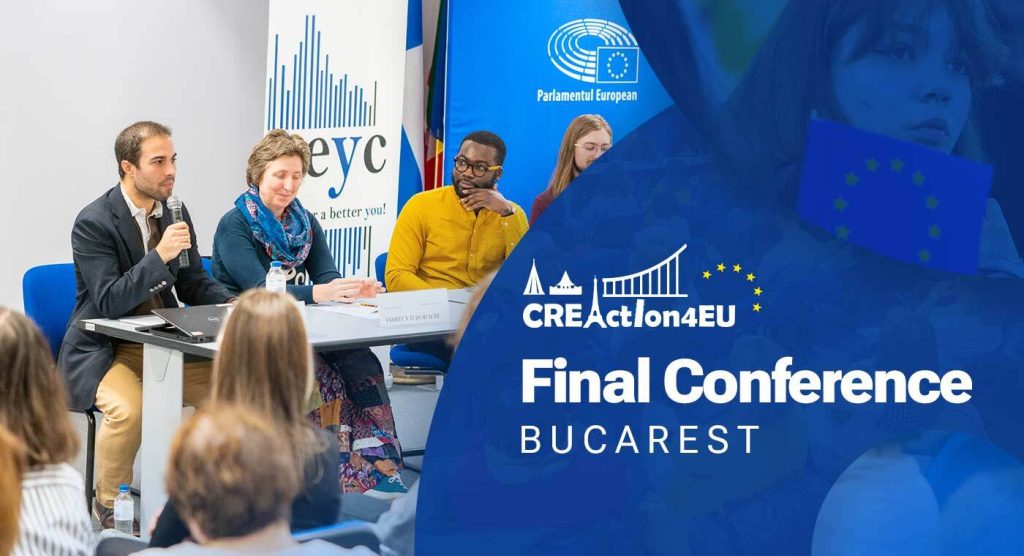The last act in Bucharest
CREAction4EU, an Erasmus+ KA2 project that started in 2021 has recently ended with the CREAction4EU Final Conference event that took place on 22nd February 2023 and was hosted by the European Parliament Liaison Office in Romania.
Through this 2 years long project, young people from 4 different European countries (France, Hungary, Italy and Romania), but also from other countries, have learned more about youth participation through digital means, active citizenship and social entrepreneurship in the Creative Industries.
During the final conference, the speakers presented the local realities that they face when it comes to the creative industries. Some points that were highlighted were the importance of the community, finding funding opportunities for your idea and being mindful of your mental health in the process.
In the last part of the conference, the participants worked together in teams and identified 3 of the most prevalent issues faced by young entrepreneurs in times of crisis, like the recent COVID-19 pandemic and they found together 3 solutions for each issue, as well as means through which the stakeholders could help out in the process of resolving these issues.
Some of the recurring points highlighted by the participants were:
- the lack of financial resources that they suggested to be solved through incubators funded by the EU, partnerships facilitated by local and national decision-makers, crowdfunding, online courses on attracting investment and governmental and EU aid for struggling small enterprises.
- decreased human resources, where they pointed out the difficulty of attracting and keeping skilled employees in the Creative Industries. In order to solve this aspect they suggested that the government should lower the taxes on small businesses and offer grants so the employers could afford to increase wages which would incentives more people to choose this career path
- the issues of uncertainty in times of crisis, which were brought to the attention of participants during the pandemic when certain economic sectors such as creative industries were harder hit than others and the authorities didn't manage to mitigate these disparities. To address this point, the participants proposed the creation of online support groups for entrepreneurs and clear national governmental plans for risk management in every economic sector so the situation would not repeat itself in the next crisis.
Introducing the resources developed by our partnership
To finalise the discussions, the consortium presented different tools that the project has developed to support creative entrepreneurs in launching innovative projects that will contribute to the resilience of their communities in times of crisis. All of these tools are available on the project’s website https://creaction-project.eu/.
The first tool is a guide for youth workers and young people with creative tools and activities to stimulate citizen participation in local communities. Compiled by InSite Drama, the Hungarian partner, this guide contains tools developed by researchers associated with the four organisations and results from different local experiences in partner countries.
The second is a methodology for ambassadors to train young creative entrepreneurs in using digital tools for their projects. This tool, inspired by the Romanian partner GEYC‘s New Media Ambassadors methodology, will further support young people using new technologies to enhance their entrepreneurial creativity.
The third tool is a platform with scenarios (playful approach) to enable creative entrepreneurs to simulate situations to stimulate their thinking and improve their skills in managing obstacles in times of crisis. Set up by JO Education – the Italian partner, the different scenarios were developed by expert youth workers and creative entrepreneurs from different organisations to support the young entrepreneurs who will use them.
Then, a last tool: a guide on creative business creation through the design thinking method, was created. The guide is written with case studies and concrete examples based on a research-action approach led by RESOPA, the French partner who was also the project coordinator. With the help of the other partners, the consortium has developed a guide highlighting an approach to creative entrepreneurship through design thinking. The guide seeks to support its potential users in developing projects that will have a positive and sustainable impact on their territories.
Coming next…
At the end of the project, the consortium announced the creation of a design thinking academy for young Europeans interested in entrepreneurship in the cultural and artistic industries. This will further support young Europeans and youth workers in building a more resilient Europe in times of crisis. More information on this academy and the first edition, which will take place in 2023, will be announced soon in the project newsletter.


